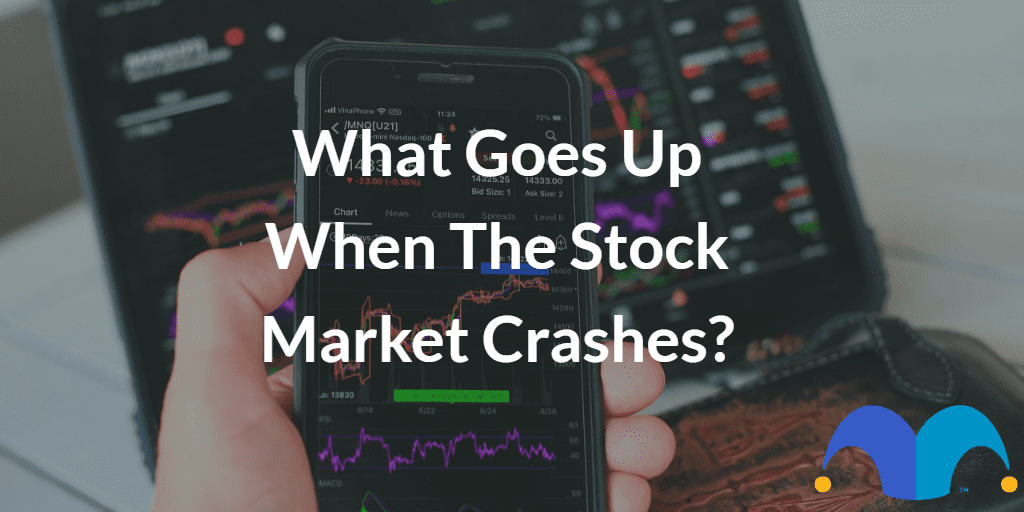Most investors dread a stock market crash, but it’s not all bad – for some, it’s an opportunity. If you’re an investor, it can be terrifying, but not everything drops in a crash.
Let’s take a look at what goes up when the stock market crashes.
Why would anything go up when the stock market crashes?
The stock market is a barometer of investors’ confidence in the market. When investors lose confidence, stocks fall.
If you think about it that way, it makes sense that the things the investors are still confident about have more chance of rising in a stock market crash. The trick is making sure you have those assets in your portfolio.
RELATED: Is the Stock Market Going to Crash?
What goes up when the stock market crashes?
We can argue about whether rising fear, uncertainty and doubt cause or result from stock market crashes, but in reality, it’s probably both.
More usefully, several investment types often rise when others fall. Of course, past performance is not an indicator of future results. Just because something rose in the last crash, it doesn’t mean it’ll rise in the next one.
That said, let’s take a look at some common options.
Safe-haven assets
Gold, silver and bonds are the classics that traditionally stay stable or rise when the markets crash. We’ll look at gold and silver first.
In theory, gold and silver hold their value over time. This makes them attractive when the stock market is volatile, and the increased demand drives the prices up. However, history shows that this is more true of gold than silver. According to GoldSilver, gold went up in six of the nine stock market crashes between 1976 and 2020, while silver only went up in two.
As fixed-income instruments, bonds offer stable income regardless of what the stock market is doing. This makes good-quality bonds a safe haven when stocks are volatile.
As always, increased demand drives prices up. Bear in mind, however, that not all bonds are quality bonds.
Essential stocks to survive and recover
Stock market crashes don’t happen on their own – something causes them. In 2020, this was the COVID-19 pandemic, and in 2008, it was the mortgage crisis. If you can identify what will help fix or survive the crisis, those stocks will probably go up.
The path out of a pandemic relies on vaccines and medical equipment, so you’d expect stocks for related companies to go up. This is indeed what happened, with stocks like Pfizer performing well during COVID-19.
You can see a similar pattern in each stock market crash, but the likely solution – and therefore the ‘right’ stocks – is different each time.
Dividend yields
A dividend yield is the amount a company pays out in dividends relative to its stock price. Dividends tend to be consistent, so when the stock price falls and the company continues to pay the same dividend, then the dividend yield rises.
While dividend-yielding stocks are more volatile than gold, they’re less volatile than other stocks. This could make them a good choice in a stock market crash.
RELATED: When Will the Stock Market Recover?
What are risky options in a stock market crash?
If you think a stock will fall in the short term, shorting or short-selling is a way to bet against it. Put simply, you borrow a few shares from a friend (for a fee), then sell them. When the price of the shares falls, you buy them back at a lower price, give them back to your friend and pocket the difference.
However, if the price rises, you still have to buy them back and return them to your friend. In this case, you foot the losses as well. Spread-betting and contract-for-difference trading is similar, and just as risky.
Derivatives should go up when the market goes down, but they’re complicated and risky. Hedging and inverse exchange-traded funds (ETFs) are based on derivatives. While these are all less risky than short-selling, they only respond to short-term changes. This makes them less helpful as a long-term safe haven in a stock market crash.
Takeaway
A stock market crash is unnerving, we know. But it’s not the end of the world. Remember, you haven’t lost anything until you sell your investments at a lower price than you bought them for.
If you include some stable assets in your portfolio to buffer you against sudden changes and invest for the long haul, it could even be an opportunity.
